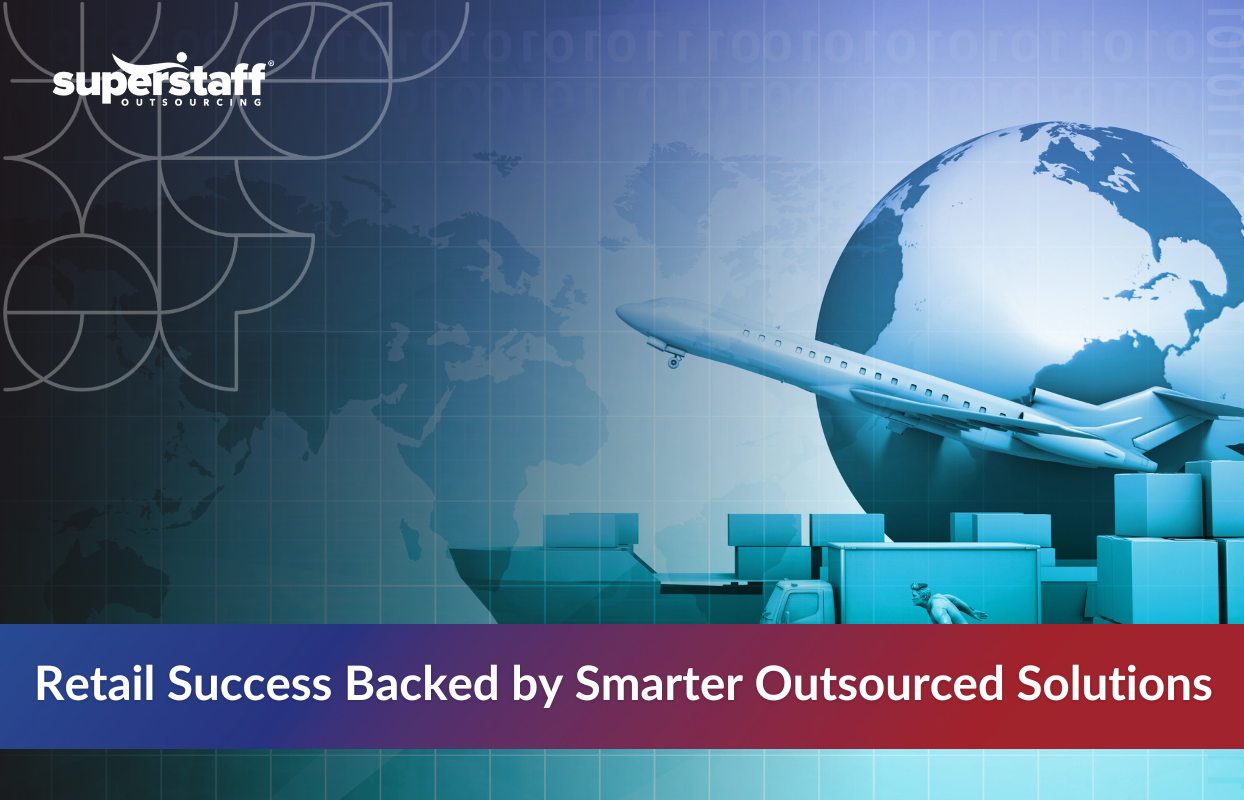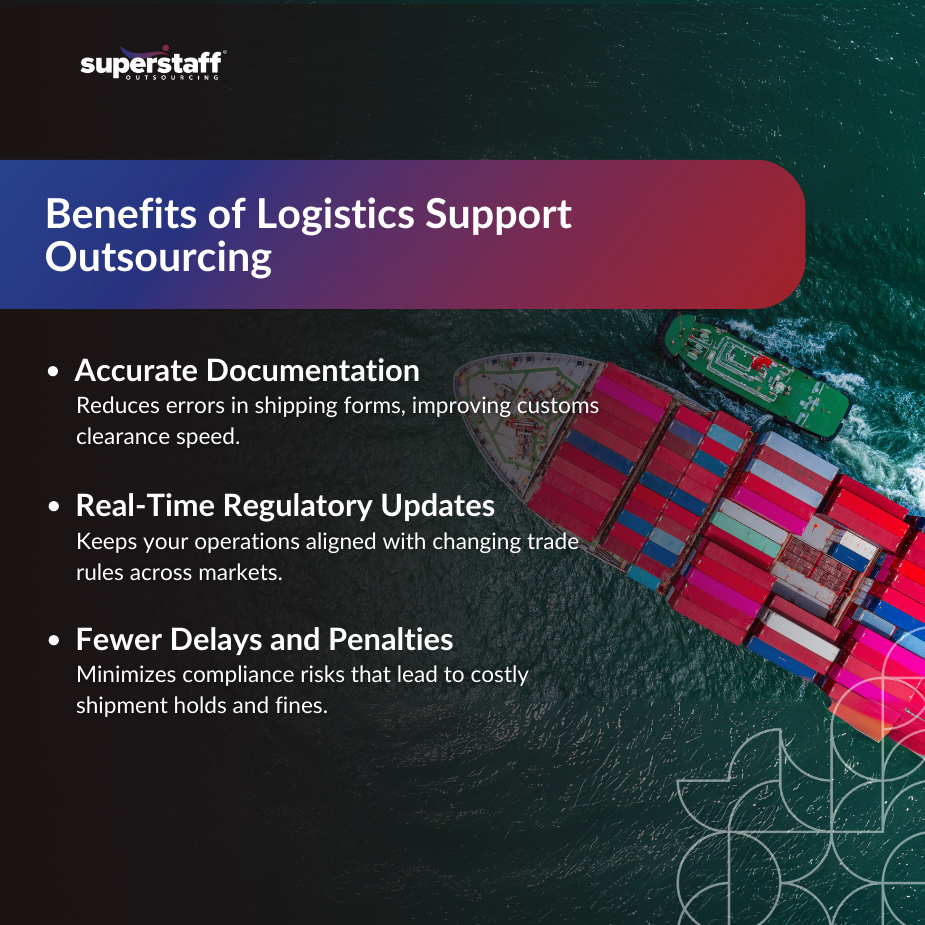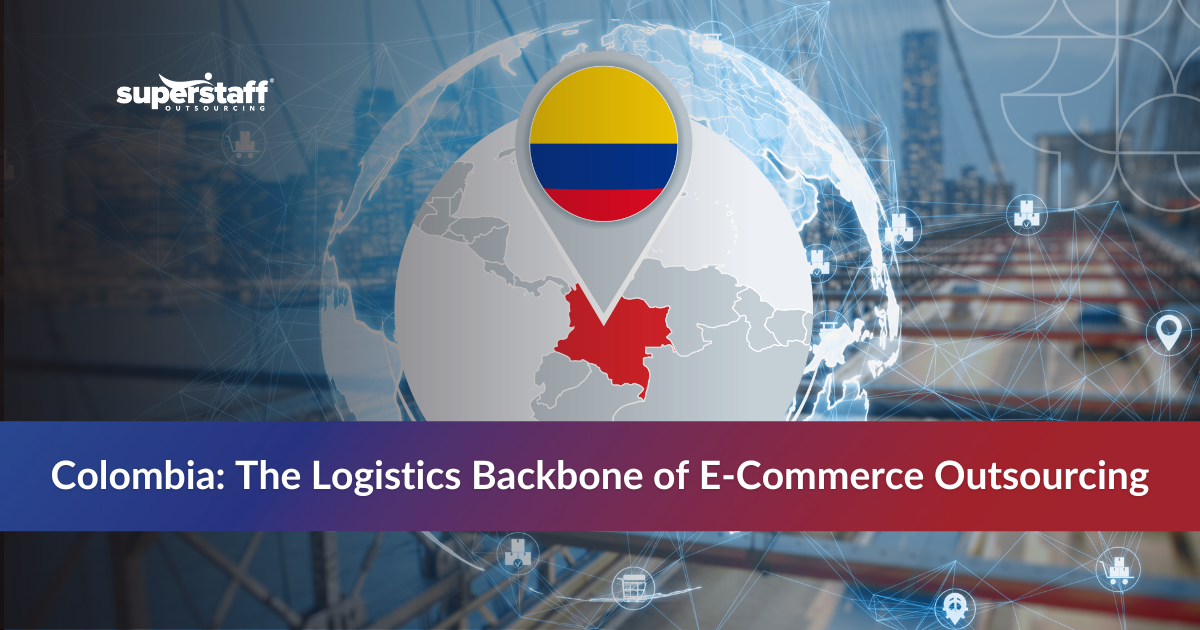
As retail companies grow internationally, managing logistics across different countries becomes a real challenge. With shifting tariffs, congested ports, and changing regulations, it’s easy for delays and compliance issues to pile up. And when that happens, profits shrink, customers get frustrated, and growth slows down.
That’s why more businesses are turning to logistics support outsourcing. By working with trusted partners, companies can simplify operations, avoid costly mistakes, and deliver better service, without stretching their internal teams too thin.
In this article, we’ll look at how logistics support outsourcing services can help you keep up with global trade, improve delivery performance, and stay one step ahead in today’s competitive market.
Global Trade Comes With a Growing List of Complications
Shipping goods across borders involves more than just moving products from one point to another. Every country has its own trade rules, paperwork requirements, and timelines. For businesses, especially in retail, even small mistakes can create major setbacks.
Key challenges include:
- Varying trade regulations – Each country sets its own import/export requirements, and these rules can change with little notice.
- Tariff changes – Sudden increases in tariffs can affect product pricing, profitability, and demand.
- Port delays and congestion – High traffic at major ports can delay shipments by days or even weeks.
- Manual paperwork and compliance errors – Incorrect or incomplete documents can lead to rejected shipments, added costs, or legal issues.
Trying to manage these logistics challenges in-house requires dedicated resources, time, and constant monitoring. International logistics outsourcing helps businesses simplify operations and reduce the strain of managing complex global trade processes in-house.
Outsourced Logistics Teams Bring Expertise in Compliance and Coordination
Shipping goods across borders requires up-to-date knowledge of import/export laws, trade agreements, and documentation standards. The benefits of outsourced logistics for trade are clear: these teams ensure that every shipment meets regulatory requirements, reduces the risk of errors, and facilitates smoother transit through customs.
These experts handle everything from preparing shipping documents to coordinating with customs brokers and local authorities. Their goal is to make sure each shipment moves as efficiently as possible, saving your business time and reducing the risk of costly mistakes.
Benefits include:

-
Accurate documentation
Properly completed forms and shipping labels help avoid clearance issues at borders. Outsourced teams understand the precise requirements for each destination, reducing the risk of mislabeling or missing data. This level of accuracy speeds up customs processing and ensures smoother transit across regions.
-
Real-time updates to regulations
Teams track regulatory changes in different markets and update procedures accordingly. Businesses don’t have to monitor every trade agreement or government notice—they can rely on their outsourcing partner to flag critical updates. This proactive approach helps companies avoid disruptions caused by non-compliance.
-
Fewer penalties and shipment holds
Reducing compliance errors minimizes the risk of delays and fines. Experienced logistics partners know how to avoid common mistakes that trigger inspections or shipment rejections. As a result, companies save time and avoid unnecessary costs.
For retail businesses with international customers, outsourcing these tasks ensures compliance without pulling focus away from core business operations. When combined with outsourcing retail tech support, the result is a more unified approach to cross-border operations and customer service.
Outsourcing Improves Supply Chain Visibility and Communication
A major part of managing global logistics is knowing where your goods are and being able to communicate that information clearly—to internal teams, customers, and supply chain partners.
Outsourced teams use digital tools to track shipments, monitor carrier performance, and share updates across all touchpoints.
Here’s how they improve visibility:
- Real-time shipment tracking: Know exactly when a product leaves the warehouse, reaches customs, and arrives at the final destination.
- Centralized communication: Coordinating across shippers, customs agents, and warehouse staff helps prevent miscommunication.
- Quick response to disruptions: When delays or reroutes occur, outsourced teams act fast to resolve the issue and update all stakeholders.
When businesses also invest in outsourcing retail tech support, they can ensure customers receive accurate delivery updates, reducing confusion and support inquiries. This kind of seamless coordination improves both internal efficiency and external service quality. A good example of companies using outsourcing in the supply chain is auto moving companies. With their worldwide networks, they’re capable of fulfilling deliveries worldwide without any hiccup.
Smarter Logistics Support Translates to Stronger Customer Experiences
Customers today expect quick deliveries with regular updates. When deliveries are delayed or there’s no communication, it can lead to frustration and harm your brand’s reputation. For example, a recent glitch in the U.S. Customs system caused delays for businesses relying on tariff exemptions, highlighting how crucial timely updates are in avoiding disruption.
Logistics support outsourcing helps ensure:
- On-time deliveries: Fewer delays mean higher customer satisfaction and better brand loyalty.
- Proactive communication: Customers appreciate updates about shipping progress, estimated delivery dates, or any issues that may arise.
- Better brand reputation: Businesses that consistently deliver on time and communicate clearly build stronger reputations in global markets.
Pairing logistics outsourcing with outsourcing retail tech support allows businesses to cover every touchpoint, from the moment an order is placed to the moment it arrives. Support teams can quickly handle inquiries, provide order status, and escalate issues as needed.
This consistent experience sets companies apart in competitive markets and helps retain customers long-term.
Outsourcing Retail Tech Support Adds Flexibility and Scalability
Retail demand isn’t steady throughout the year. Seasonal peaks, sales events, and product launches all create spikes in order volume. Managing these surges in-house often means hiring, training, and eventually downsizing teams—an expensive and time-consuming process.
Outsourcing offers a flexible solution:
- Scalable staffing: Outsourced teams can ramp up quickly during busy periods and scale down when demand decreases.
- No extra infrastructure: Businesses avoid the cost of expanding office space or adding equipment.
- Trained professionals on demand: Providers supply experienced staff who can step in without a long onboarding process.
This is especially important for growing companies expanding into new regions or launching new product lines. Outsourcing retail tech support alongside logistics also means access to continuous retail tech upgrades. These upgrades help streamline processes, automate repetitive tasks, and ensure you’re always on top of the latest innovations without needing to invest heavily in in-house IT infrastructure.
Logistics Support Outsourcing and Long-Term Growth
While outsourcing can help manage day-to-day logistics, its biggest value is in supporting long-term business growth. Companies with strong logistics and tech support foundations can explore new markets, serve more customers, and deliver better results—all without adding unnecessary complexity.
A reliable outsourcing partner can help businesses:
- Enter new international markets with less risk
- Improve delivery performance and reduce costs
- Strengthen customer service and satisfaction
- Focus internal teams on product development and strategic planning
Logistics support outsourcing helps businesses expand into new markets with less risk. By outsourcing logistics and tech functions, companies can strengthen their operations, improve customer service, and focus on long-term growth while avoiding the costs of expanding internal teams.
Build a Smarter Global Supply Chain With Expert Support
Global trade presents serious challenges, but they don’t have to hold your business back. From compliance issues and delivery delays to rising support demands, managing international operations can be challenging without assistance. Outsourcing logistics for smoother international trade helps mitigate these challenges, ensuring that your business can maintain a steady flow of operations.
Outsourcing enables businesses to stay compliant, minimize shipping errors, and deliver improved service to customers worldwide. It also gives companies the flexibility to grow and adjust without taking on the costs and risks of expanding internal teams.
Ready to take the stress out of global logistics? SuperStaff offers reliable logistics and outsourcing retail tech support services to help you streamline operations, improve delivery times, and keep your customers satisfied. Contact SuperStaff today to discover how our logistics support outsourcing can help your retail business thrive.






